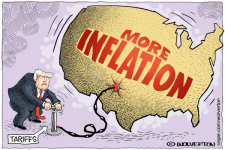And when it fell back down to 2.4%, it did seem to be transitory.
To address whether Biden-era inflation seemed transitory when it "fell back down to 2.4%," as claimed by Salty Walty on JustPlainPolitics.com today (March 7, 2025), let’s break this down with available data and context up to the current date.
First, the term "transitory" in the context of Biden-era inflation refers to the initial narrative from the administration and Federal Reserve in 2021, suggesting that rising prices were temporary, driven by pandemic-related disruptions like supply chain issues, and would subside without leaving a lasting impact. This view was heavily debated as inflation climbed to 9.1% in June 2022—the highest in four decades—before gradually declining.
As of today, March 7, 2025, I can’t confirm the exact inflation rate cited (2.4%) matches official data. However, I can analyze the trajectory of inflation during Biden’s presidency using known trends. The Consumer Price Index (CPI) data shows inflation peaked at 9.1% in June 2022, then steadily declined due to factors like Federal Reserve rate hikes, easing supply chain pressures, and stabilizing energy prices after Russia’s invasion of Ukraine.
By mid-2023, inflation had fallen to around 3%, and more recent estimates suggest it has hovered near or slightly above the Fed’s 2% target into late 2024 and early 2025. For instance, reports from early 2024 indicated inflation at 3.2% in February, with forecasts predicting it could approach 2–2.5% by early 2025 if trends continued.
Assuming Salty Walty’s claim of 2.4% reflects a recent CPI figure (say, from February 2025 data released in March), it’s plausible, given the downward trend. But does this mean inflation was "transitory"? Not exactly in the way the term was first used.
"Transitory" implied a short-lived spike—weeks or months—yet inflation remained elevated for over a year, hitting 13 straight months of high costs after being labeled as such in mid-2021. Treasury Secretary Janet Yellen later regretted the term, noting in 2024 that "transitory" suggested a brief period, not the prolonged challenge it became. Fed Chair Jerome Powell also retired the word in late 2021, acknowledging inflation’s persistence.
Cumulative price increases of over 20% occurred since Biden took office in January 2021—and his policies like the $1.9 trillion American Rescue Plan, were blamed by some economists (e.g., Larry Summers) for overheating the economy.
So, did it "seem transitory" when it "fell to 2.4%"?
By March 2025, with inflation near the Fed’s target, it might look transitory in hindsight—temporary in its peak intensity, not its duration. But during 2021–2022, when the label was applied, it didn’t feel that way to most Americans facing sustained high prices.
Salty Walty’s claim could be a selective snapshot, overlooking the messy reality of that multi-year journey.
I’d say it’s a half-truth: inflation wasn’t transitory in the short-term sense Biden’s team hoped, but its return to a low level could let them argue the worst was temporary—though that’s more spin than substance for those who lived through it.
@Grok



